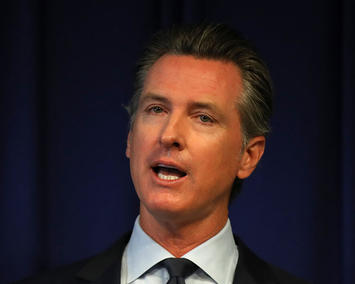
If Hollywood were to cast a governor and future president, and if a straight white male were still politically acceptable, he would look like California’s Gavin Newsom. The 53-year-old governor, a former mayor of San Francisco, Newsom handsomely epitomizes the preening politics of the California elite class that has nurtured and financed his career from the beginning.
Like aristocrats of the past, Newsom seems oblivious to the realities felt by constituents among the lower orders. In the face of massive wildfires, he postures on climate change, conflating fires with an angry mother Earth—as opposed to poor land management—and uses the conflagration to justify a radical policy of switching to all-electric power over the next decade, with the elimination of gas-powered cars by 2035. In the midst of a near economic free-fall, he favors raising taxes and works to tighten pandemic lockdowns; and, with the state losing its ability to train workers, he backs an education system where almost three out of five California high schoolers graduate unprepared for either college or a career.
Listening to Newsom, or following California media, one would have no idea how badly California’s economy has performed during the pandemic. In the most recent statistics, California’s unemployment rate stood at 11 percent, well above the national average of 7.9 percent, and better than only four other states. Since the March lockdown, California, with 12 percent of the nation’s population, accounts for 16.4 percent of all unemployment. California also is recovering jobs slower than all but two states, tourism-dependent Hawaii and Nevada. Since the pandemic, the state’s largest metro, Los Angeles–Orange County, has suffered the second-largest job losses in the U.S., and two others, the Bay Area and the Inland Empire, rank in the top ten.
This awful performance has had little impact on the state’s politically and economically well-positioned ruling class. Newsom may be far from a popular governor, ranking in the lower third among his compatriots, but he enjoys a solidly Democratic legislature and almost lockstep support in the media. Voters are showing signs of getting restless, though, defeating proposals and taxes that he heartily endorsed along with his public-union and tech-industry allies. Typically, he avoided taking a position on Proposition 22, the ban on contract labor detested by the tech firms but deeply supported by the unions.
Conservatives like to ascribe the label “leftist” to politicians such as Newsom. In reality, California’s governor is no Marxist firebrand but rather a favored candidate of what the Los Angeles Times described as “a coterie of San Francisco’s wealthiest families,” including the Fishers (who founded the Gap clothing chain), the Pritzkers (whose family includes the current Illinois governor), and especially the Getty family, which essentially adopted Newsom, financed his business ventures, and allegedly paid for his first lavish wedding while helping launch his political career. These families overall have prospered in California’s highly bifurcated economy, among the least egalitarian in the nation. Its prime beneficiaries cluster along the state’s postindustrial, temperate zones.
Newsom rose, as former assembly speaker and San Francisco mayor Willie Brown suggests, as the favored spokesman for San Francisco’s local well-to-do. “He came from their world, and that’s why they embraced him without hesitancy and over and above everybody else,” Brown told the Los Angeles Times. “They didn’t need to interview him. They knew what he stood for.”
Newsom postures as a social-justice advocate and believer in austere green virtues, but the corporate aristocracy has helped him live in luxury, first in his native Marin, and now in Sacramento. Newsom’s passion for the good life caused him some embarrassment recently when he was caught violating his own pandemic orders at the ultra-expensive, ultra-chic French Laundry in Napa. This episode exemplifies America’s elite nomenklatura—demanding sacrifices of the masses, whether in the form of lockdowns or housing, but less often from themselves.
In addition to woke posturing on race and gender issues, climate change stands as the key driver of this kind of politics. In many regions, notably the Midwest, Democrats face a conflict between siding with the environmental lobby or with workers in fossil fuels, large-scale manufacturing, and construction. That tension is less evident in California, where a draconian tax and regulatory environment has reduced construction, particularly in the big coastal metros, and where manufacturing has stagnated, while policymakers have targeted the heavily unionized oil industry for extinction.
Draconian climate-change policies allow progressive elites to advertise their good intentions without curtailing their economic opportunities. The state’s renewable-energy policies enrich his Newsom’s tech backers even when their efforts—such as the Google-backed Ivanpah solar farm—fail to deliver affordable, reliable energy, and bring severe impacts on sensitive habitats, notably in the state’s deserts. Even the most impressive of the tech masterminds, Elon Musk, can trace a significant part of his fortune—now estimated at over $100 billion, the world’s fifth-largest—to generous subsidy policies for solar panels and electric cars. Policies that raise energy and housing prices, of course, tend to be politically unpopular—so Newsom, like his predecessors, imposes these regulations administratively, or through executive orders, thus freeing the governor to avoid legislative and political tangles and freeing him of any obligation to explain these positions to the public.
Read the rest of this piece at City Journal
Joel Kotkin is the author of The Coming of Neo-Feudalism: A Warning to the Global Middle Class. He is the Presidential Fellow in Urban Futures at Chapman University and Executive Director for Urban Reform Institute. Learn more at joelkotkin.com and follow him on Twitter @joelkotkin.












